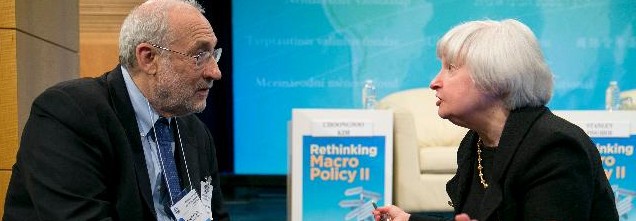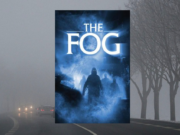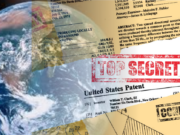The (Australian) ABC radio reported on the Trans Pacific Partnership (TPP) on Friday evening. Professor Joseph Stiglitz (Columbia University), spoke from London to Mark Colvin (host of ABC PM). The Nobel Prize-winning economist and author of “The Great Divide: Unequal Societies and What We Can Do About Them,” urges caution on the TPP.
Well – if this Janet Yellen supporter, and former chief economist of the World Bank is waving the red flag, then we are really in trouble.
 Professor Joseph Stiglitz and Janet Yellen at a macro policy discussion during the International Monetary Fund (IMF) and World Bank Group Spring Meetings in April 2013.
Professor Joseph Stiglitz and Janet Yellen at a macro policy discussion during the International Monetary Fund (IMF) and World Bank Group Spring Meetings in April 2013.
Colvin asked Stiglitz about the secrecy surrounding the TPP. These are extracts from the radio interview (audio here)
STIGLITZ: Well fortunately we know quite a bit about it because of Wikileaks. The US government not only has not revealed the negotiating position, actually has classified it. So we can’t even use Freedom of Information Act to find out about it. This is really, in my mind, an outrage…. (And he has probably just read the leaked bits.)
…we’re setting the rules of the game for the 21st century; rules about regulation, rules about drugs. These are really critical aspects for the running of our society, affecting our health, our environment.
Just to give you one example, about 30 years ago we passed in the United States something, a law called the Hatch-Waxman Act, which represented an attempt to reach a compromise, a balance between big pharma, the patent drugs and generics. …we know that the US is negotiating for a position that would make it much more difficult to get access to generic medicines, that would drive up drug prices. They’re asking for something that even the president of the United States has opposed.
COLVIN: So how would this affect, say, Australia’s PBS, the pharmaceutical benefits scheme, and the PBAC which stands behind it which negotiates with international drug companies and sets the prices the patients end up paying?
STIGLITZ: Effectively they’re trying to undermine your ability to have that…
COLVIN: And how would they do that? …
STIGLITZ: Well just outlaw it…
…a second separate part that have gotten Americans across the board, both on the left and the right, really, really angry. And that is, they’re trying to create a new judicial system as it were, a private one.
You know, we used to think that one of the basic functions of government is dispute adjudication, resolution of disputes, and they’re creating this very, very expensive system of dispute resolution only available to corporations. Not available to civil society if there is a violation in the agreement, only to corporations.
COLVIN: Australia has negotiated a number of regional free trade agreements and is enthusiastic about the TPP. The Australian Government says that it will be an enormous boost for our economy. Will it?
STIGLITZ: Almost surely not…
COLVIN: Who does benefit then from a TPP like that?
STIGLITZ: Our drug companies… big pharma. The generic drug companies in the United States are actually opposing this.
The tobacco industry will like it because it will make it easier for them to sue any country in the region who signs up, if they try to regulate tobacco, even mild regulations about package labelling…
COLVIN: But won’t there be a net increase in exchanges of goods, services and even labour?
STIGLITZ: There will be some, and this is where I said the impact will differ from country to country. Countries like the United States that export mostly capital intensive goods, like airplanes, they’ll find net almost surely the job destroying effects of imports greater than the job creating effects of exports. (my emphasis)
It is clear, to even mainstream economists that the TPP is a corporate take-over.






























Dee, you’re like a dog with a bone. You just won’t give it up will you.
Jon Rappaport wrote a Dee-like article about the proposed TPP, pointing to the weirdness of the fact that in America the government (he means the Executive branch) has “classified” the TPP — so any senator who has read it is prevented from saying what he saw.
Rappaport wants a senator (or preferably a whole bunch of them) to spill TPP secrets and get arrested “thus triggering a constitutional crisis.”
I think he’s incorrect. There would not be a crisis. Per Article I, section 3, of the US Constitution, the House of Reps can impeach a president, and the Senate can convict. (Too bad they use the word ‘convict.’ It only means they confirm the House’s “articles of impeachment.”) Out he goes, on his ear. There is no appeal. No constitutional crisis! Everybody gets to know what is in the TPP. Yay.
Well, Minister Robb with your Canberra bureacrats and msm globalists, do you have anything to say to alleviate the fears in Australia that, as per Lima declaration 1975, you are continuing to betray Australia’s sovereignty?
ABC Overnight National hosted by Rod Quinn had Matthew Rimmer from the ANU discussing the TPP.
I got on air to reinforce two key points.
1. The TPP will advantage monopoly power and disadvantage most Australians.
2. The TPP political PROCESS is the real issue when most Australians, including our representatives that make our laws and must vote on this legislation, remain in the dark because of secrecy surrounding the content and intent of the proposal.
Generally, Rod and Matthew discussed the incredible realities surrounding the subject with realism and honesty.
It was a long discussion which allowed many important aspects and concerns that have been identified here at Gumshoe to be discussed and questioned.
The other notable point is this is happening on our National broadcaster at the very early hours before 6.00 AM.
Once the early current affairs kick in at 8.00 with AM the tone is adjusted to a slanted Corporate monopoly bias where the dangers and threats are minimized and the “free trade positives” are given exaggerated play.
Overall, the program was a very good report on the TPP.
It would be great to get a podcast and make it available to a wider audience. I will make inquiries.
[…] “The Great Divide” – And Secretly Planning For An Even Greater Divide […]